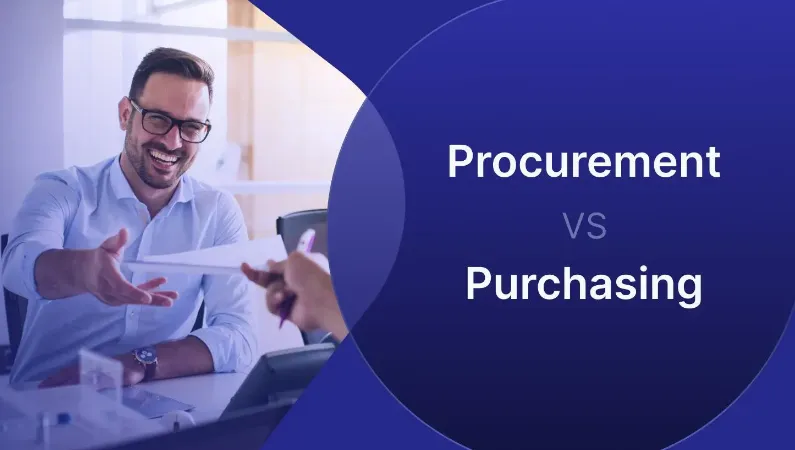Purchasing Agent vs. Procurement Agent: The Strategic Difference That Defines Modern Supply Chains

If you’ve ever posted a job ad for a "Purchasing Agent" but really needed a strategic thinker, you’ve felt the cost of this confusion. In the intricate world of supply chain management, terminology matters. The conflation of "Purchasing Agent" and "Procurement Agent" isn’t just a HR oversight; it’s a strategic misstep that leads to misaligned expectations, wasted resources, and missed opportunities.
This isn't an academic debate. It's a practical framework for deciding how your organization sources goods and services. Do you need a tactical expert to execute transactions flawlessly, or a strategic partner to architect a resilient, value-driven supply base? Understanding the distinction is the first step toward building a procurement function that doesn’t just save money, but drives competitive advantage.
Let's move beyond the dictionary definitions and into the operational realities that define these two critical roles.

At its heart, the difference is one of philosophy and scope.
A Purchasing Agent is a specialist in the transaction. Their world revolves around the "buy." They are masters of execution, focused on the efficient, accurate, and cost-effective fulfillment of immediate needs. Think of them as elite tactical operatives, ensuring the supply lines are open and flowing.
A Procurement Agent, conversely, is an architect of the process. Their domain is the entire sourcing lifecycle. They are strategists who look beyond the price tag to the Total Cost of Ownership (TCO), managing risk, fostering innovation, and building supplier relationships that create long-term value. They are the generals designing the supply chain strategy.
This fundamental difference in focus cascades into every aspect of their responsibilities, performance metrics, and impact on your business.
To truly grasp the distinction, you need to see it in practice. This table isn't just a comparison; it's a blueprint for defining which role you need on your team.
|
Dimension |
The Purchasing Agent (The Tactician) |
The Procurement Agent (The Strategist) |
|---|---|---|
|
Primary Focus |
Order Fulfillment & Transaction Management |
Total Value Creation & Supply Base Strategy |
|
Core Responsibilities |
• Processing Purchase Orders (POs) & managing the PO lifecycle. |
• Developing and executing strategic sourcing plans for entire categories. |
|
Key Performance Indicators (KPIs) |
• Purchase Order Accuracy Rate: Measures process efficiency. |
• Total Cost of Ownership (TCO) Reduction: The holy grail, measuring true cost savings beyond unit price. |
|
Supplier Relationship |
Transactional & Short-Term. The relationship is defined by the current order and its specific terms. |
Strategic & Long-Term. The relationship is a partnership focused on continuous improvement, innovation, and shared value. |
|
Role in Innovation & ESG |
Limited. Typically follows predefined policies and approved supplier lists set by strategy. |
Central. Actively seeks out suppliers with innovative capabilities and robust ESG credentials to de-risk and future-proof the supply chain. |
This is the crux of the matter. Your business needs should dictate the role you prioritize, hire for, or outsource.
Operational Efficiency: You have a high volume of orders and need a dedicated professional to ensure accuracy and timeliness, preventing production delays.
Tactical Cost Control: You need a sharp negotiator to fight for the best price on specific, one-off purchases.
Stable Supply Base: Your suppliers are already vetted and strategic relationships are managed elsewhere. You need a flawless executor.

Building Supply Chain Resilience: You need to map your supply chain, identify single points of failure, and develop a robust supplier risk management program.
Achieving ESG Mandates: You require a professional to conduct supplier sustainability audits, enforce a supplier code of conduct, and source from diverse or environmentally certified suppliers.
Unlocking Innovation: You want to collaborate with suppliers on new product development or process improvements.
Managing Complex Categories: You are sourcing highly specialized, high-value, or long-lead-time items where the strategic stakes are enormous.
The global business landscape has dramatically elevated the importance of the Procurement Agent's skill set. It's no longer a nice-to-have; it's a core business imperative.
ESG is Now Boardroom Agenda: Investors, regulators, and customers demand ethical and sustainable supply chains. The Procurement Agent is the frontline officer implementing this strategy, moving beyond cost to evaluate suppliers on environmental, social, and governance criteria.
Geopolitical Volatility is the New Normal: Recent disruptions have proven that the lowest price is meaningless if the supplier cannot deliver. The Procurement Agent's focus on supplier risk assessment and geographic diversification is your best insurance against chaos.
Data is the New Oil: Procurement Agents leverage spend analytics and market intelligence platforms to make data-driven decisions, moving procurement from a back-office function to a strategic insights hub.
Understanding the difference is step one. Taking action is step two.
Audit Your Current Needs: Review your last year's spend. How much was tactical, repetitive buying? How much required complex, strategic sourcing? The ratio will guide your hiring or outsourcing priorities.
Write the Right Job Description: Be precise. If you need a strategist, use titles like "Strategic Procurement Agent" or "Sourcing Specialist" and list responsibilities like "develop category strategies" and "manage supplier relationships."
Consider the Hybrid Model (Procurment-as-a-Service): For many companies, especially SMEs, hiring a full-time strategic Procurement Agent is a stretch. This is where partnering with a global procurement service provider shines. They instantly provide the strategic oversight, supplier network, and risk management capabilities of a seasoned Procurement Agent, without the overhead. You retain internal Purchasing Agents for day-to-day execution while outsourcing the strategy.
Upskill Your Team: Invest in training for your existing Purchasing Agents in strategic sourcing principles, negotiation beyond price, and basic risk assessment. This bridges the gap and builds internal capacity.
Ready to Define Your Strategy?
If this analysis has clarified that your business needs strategic oversight, we can help. Our team acts as your external Procurement Agents, providing the expertise to build resilient, ethical, and cost-optimized supply chains.
Q1: I'm a small business owner handling procurement myself. When's the right time to hire my first dedicated agent?
A: The first pinch point is usually when you're spending more time putting out fires—like chasing orders and dealing with quality issues—than working on your business. If you're missing cost-saving opportunities because you're too busy with transactions, or if supplier risk keeps you up at night, it's time. Start with a Purchasing Agent to get control, then consider a Procurement Agent as you scale.
Q2: How does the day-to-day software used differ between these two roles?
A: A Purchasing Agent lives in the ERP system (like SAP or Oracle) and Excel, focused on processing POs and tracking deliveries. A Procurement Agent uses more specialized tools: spend analytics platforms (like Coupa or SpendHQ), supplier risk intelligence software, and contract lifecycle management (CLM) systems to do their job strategically.
Q3: Which role has more interaction with other departments like Finance or R&D?
A: The Procurement Agent, without a doubt. They partner with Finance on budgeting and cost reporting, collaborate with R&D on new product sourcing, and work with Legal on contract terms. The Purchasing Agent's interactions are more operational, primarily with Logistics/Warehouse and the requisitioning department.
Q4: In a manufacturing company, how are the responsibilities split for a critical raw material?
A: The Procurement Agentwould be responsible for the strategy: finding and qualifying the supplier, negotiating the master supply agreement, and setting the quarterly price based on market indices. The Purchasing Agentwould then execute against that contract: issuing the weekly POs based on the production schedule and managing the delivery schedule.
Q5: Can a strong Purchasing Agent eventually grow into a Procurement Agent role?
A: Absolutely, and it's a classic career path. The key is to proactively develop skills beyond the PO. This means volunteering to help with supplier evaluations, analyzing spend data to find savings opportunities, and learning the basics of contract law. It's a shift from a focus on process to a focus on strategy.
Q6: How does company size typically influence which role they hire for?
A: Startups and very small companies often hire a "do-it-all" Purchasing Agent who handles both tactical buying and some strategic sourcing out of necessity. Larger enterprises can afford to specialize, with dedicated Procurement Agents setting strategy for categories and teams of Purchasing Agents executing the transactions.
Q7: What's one common misconception each role has about the other?
A: Purchasing Agents might see Procurement Agents as being out of touch with the daily pressures of operations. Procurement Agents might view Purchasing Agents as being too focused on the "now" and not considering the long-term implications of their buying decisions. Bridging this gap requires clear communication and shared goals.
Q8: If I'm looking to outsource this function, what should I ask a potential service provider to see if they're strategic or just tactical?
A: Don't just ask, "Can you buy this for me?" Ask:
"How do you conduct supplier risk assessments?"
"Can you provide a example of how you've helped a client reduce Total Cost of Ownership, not just unit cost?"
"What is your process for ensuring ESG compliance in your sourced suppliers?"
Their answers will tell you everything.
Q9: With the rise of e-procurement platforms that automate buying, is the Purchasing Agent role becoming obsolete?
A: Not obsolete, but evolving. The platform handles the repetitive, low-value transactions. This frees up the Purchasing Agent to focus on more complex tasks, like resolving invoice discrepancies, managing exceptions, and providing a human layer of oversight. Their role becomes more about exception management and less about routine processing.
Q10: From a personality fit, what different traits thrive in each role?
A: A great Purchasing Agent is incredibly organized, detail-oriented, thrives on process, and can work well under pressure to meet deadlines. A great Procurement Agent is naturally curious, analytical, a strategic thinker, and an excellent negotiator and relationship-builder. One excels in execution, the other in strategy.
Contact us
Call Us: +86 193 7668 8822
Email:[email protected]
Add: Building B, No.2, He Er Er Road, Dawangshan Community, Shajing Street, Bao'an District, Shenzhen, China